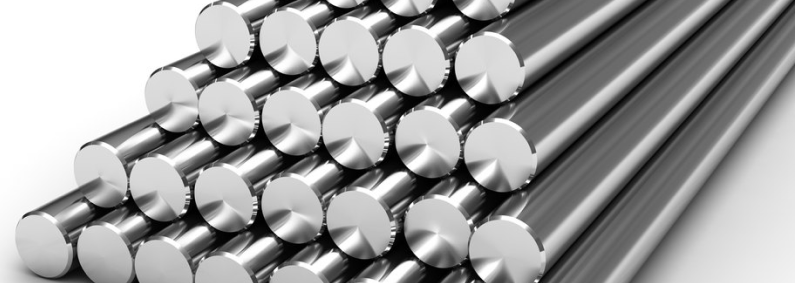Stainless Steel 304, 316L Round Bars

Stainless Steel 304 and 316L round bars are essential components in a variety of industries due to their excellent corrosion resistance, strength, and versatility. These round bars are manufactured to meet the demanding requirements of diverse applications, offering superior machinability and durability.
Stainless Steel 304 Round Bars
Stainless Steel 304 is the most commonly used stainless steel grade due to its exceptional corrosion resistance, formability, and ease of fabrication. It is referred to as the “18/8” stainless steel because it contains 18% chromium and 8% nickel, which provide superior resistance to atmospheric and chemical corrosion.
Key Features of Stainless Steel 304 Round Bars
- Corrosion Resistance: Excellent resistance to a wide range of atmospheric and chemical environments.
- Strength and Durability: High tensile and yield strength, making it suitable for structural applications.
- Ease of Fabrication: Easily welded, machined, and formed into various shapes.
- Hygiene: Non-reactive to most substances, making it ideal for food and medical applications.
Common Applications of Stainless Steel 304 Round Bars
- Architectural and structural supports
- Food processing equipment
- Chemical containers and piping
- Automotive components
- Medical instruments and surgical implants
Chemical Composition of Stainless Steel 304
| Element | Percentage |
|---|---|
| Chromium (Cr) | 18.0-20.0 |
| Nickel (Ni) | 8.0-10.5 |
| Carbon (C) | 0.08 (maximum) |
| Manganese (Mn) | 2.0 (maximum) |
| Silicon (Si) | 1.0 (maximum) |
| Phosphorus (P) | 0.045 (maximum) |
| Sulfur (S) | 0.03 (maximum) |
Stainless Steel 316L Round Bars
Stainless Steel 316L is a low-carbon version of 316, offering improved corrosion resistance, especially in chloride-rich environments. It contains molybdenum, which enhances its resistance to pitting and crevice corrosion.
Key Features of Stainless Steel 316L Round Bars
- Enhanced Corrosion Resistance: Particularly effective in marine and chemical processing environments.
- Low Carbon Content: Minimizes carbide precipitation during welding, improving weldability.
- High Strength: Provides excellent tensile and creep strength at elevated temperatures.
- Biocompatibility: Safe for medical and pharmaceutical applications.
Common Applications of Stainless Steel 316L Round Bars
- Marine hardware and coastal infrastructure
- Chemical and petrochemical processing
- Pharmaceutical and food-grade equipment
- Heat exchangers and condensers
- Industrial machinery and fasteners
Chemical Composition of Stainless Steel 316L
| Element | Percentage |
|---|---|
| Chromium (Cr) | 16.0-18.0 |
| Nickel (Ni) | 10.0-14.0 |
| Molybdenum (Mo) | 2.0-3.0 |
| Carbon (C) | 0.03 (maximum) |
| Manganese (Mn) | 2.0 (maximum) |
| Silicon (Si) | 1.0 (maximum) |
| Phosphorus (P) | 0.045 (maximum) |
| Sulfur (S) | 0.03 (maximum) |
Mechanical Properties
| Property | Stainless Steel 304 | Stainless Steel 316L |
|---|---|---|
| Tensile Strength (MPa) | 515 (minimum) | 485 (minimum) |
| Yield Strength (MPa) | 205 (minimum) | 170 (minimum) |
| Elongation (%) | 40 | 40 |
| Hardness (HRB) | 92 (maximum) | 95 (maximum) |
Available Forms
- Round Bars: Standard sizes and custom lengths available.
- Hex Bars: For specialized applications requiring enhanced grip and torque.
- Flat Bars: Versatile solutions for structural and machining needs.
- Square Bars: Ideal for precision and uniformity in design.
- Custom Shapes: Tailored to specific project requirements.
Manufacturing Standards
- ASTM A276: Standard Specification for Stainless Steel Bars and Shapes.
- ASTM A479: Standard Specification for Stainless Steel Bars for Pressure Vessels.
- ASME SA479: Pressure vessel-grade stainless steel specifications.
FAQs
SS 304 is more economical and widely used, while SS 316L offers enhanced corrosion resistance, especially in marine and chemical environments, due to its molybdenum content.
Yes, both grades are weldable using standard welding techniques. SS 316L is particularly suited for welding as it minimizes carbide precipitation.
SS 316L is the preferred choice for marine applications due to its superior
- resistance to chloride-induced corrosion.

Products
Industry We Serve
- Oil & Gas industries
- Chemical process industries
- Pump and valve in high pressure component
- Food industries
- Pulp and paper industry
- Aerospace industry
- Power plant
- Mechanical component
- Sugar industry
- Cement industry
